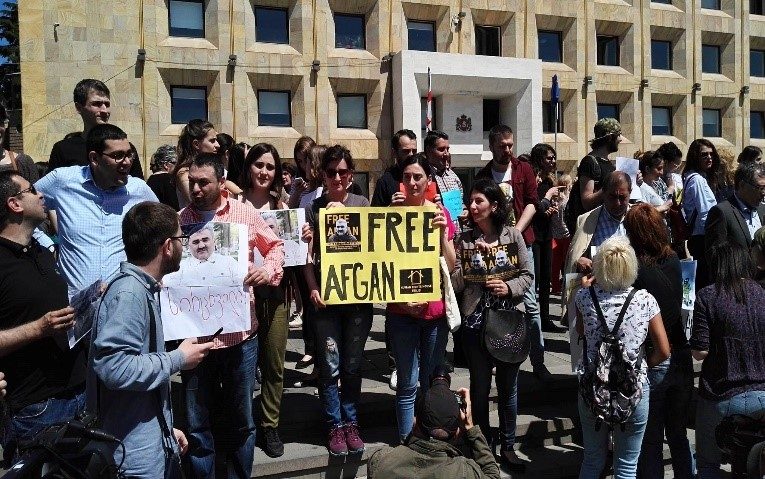Afgan Mukhtarli, citizen of Azerbaijan, is an investigative journalist and activist. He has been working as a journalist in Azerbaijan since 1999 and criticized the Azerbaijani authority and human rights violations in his country.
Because of his journalistic and civic activism, he was arbitrarily arrested, physically assaulted and intimidated several times by the Azerbaijani authorities. Consequently, in January 2015, Afgan together with his wife, Leyla Mustafaeva (freelancer journalist), and their child arrived in Georgia, where Afgan and his wife continued their journalistic activities.
Afgan Mukhtarli, citizen of Azerbaijan, is an investigative journalist and activist. He has been working as a journalist in Azerbaijan since 1999 and criticized the Azerbaijani authority and human rights violations in his country.
Because of his journalistic and civic activism, he was arbitrarily arrested, physically assaulted and intimidated several times by the Azerbaijani authorities. Consequently, in January 2015, Afgan together with his wife, Leyla Mustafayeva (freelancer journalist), and their child arrived in Georgia, where Afgan and his wife continued their journalistic activities.

Facts with regard to alleged abduction of Afgan Mukhtarli
- Afgan Mukhtarli disappeared in the evening of May 29, 2017, at about 19:30 pm;
- As his friend Dashgin Agalarl recalled, they parted at about 19:00 pm, after they had left a café near Baratashvili street, in Tbilisi;
- Afgan called his wife, Leyla Mustafayeva, and told he would be home soon but he never showed up afterwards;
- In the morning of May 30, Leyla Mustafayeva applied to the police with the support of the lawyer of the Article 42 of the Constitution, HRHT member organization;
- On May 30, the HRHT organized a special press-conference about Afgan’s disappearance;
- The criminal case was launched under the Article 143 of the Criminal Code of Georgia, which refers to illegal restriction of freedom;
- In the evening of May 30, Azerbaijani friends informed Leyla Mustafayeva that Afgan was in detention in Baku, that was later confirmed officially;
- The lawyer in charge of the case and Afgan’s wife received information about Afgan’s alleged abduction from his Azerbaijani lawyers;
- According to Afgan’s statement, he was forcibly pushed into the car near his house in Tbilisi (in the vicinities of the Niagvari street) and was kidnapped from there. According to Afgan the kidnappers were in police uniforms and were speaking Georgian.
- The car was driving in the direction of the Tbilisi Airport, after that, the abductors put a bag over Afgan’s head.
- Later on, the bag was removed and they blinded Afgan’s eyes by sticky bands.
- As Afgan recalled, the car was changed twice; in the last car the people were speaking in Azerbaijani language.
- Afgan was taken into a building, which was later identified as the Azerbaijani customs office by Afgan after the blinds were removed from his eyes. He was arrested for illegal crossing of the border and the officers planted 10 000 EURO into his pocket.
- In the evening of May 30, Afgan Mukhtarli was taken to the Baku Khatai police unit. Meanwhile, Afgan was not allowed to contact his relatives and lawyer.
- On May 31, the charge for illegal crossing of the border, smuggling and violently resisting a law enforcement official was imposed to Afgan Mukhtarli. On the same day, the Baku court sentenced Mukhtarli to 3-month pre-trial imprisonment.

- On May 31, Azerbaijani Prosecutor’s Office reported that on May 29, at 22:40 pm local time, Afgan Mukhtarli was arrested for illegal crossing of the border in Balkan district. The district is bordering Lagodekhi municipality of Georgia. The prosecutor’s office reported that the journalist had 10 000 EURO with him during the detention and he resisted the police officers.
- On June 1, the lawyer working on the case appealed the Old Tbilisi police unit to allow him study the criminal case materials and disclose the video-recordings from the surveillance-cameras.
- Only on June 13, the lawyer was allowed to read the case materials, which certified that the investigation started, thereby, testimonies of the witnesses (about 200 witnesses), who know nothing about the case, are collected.
- On June 13, when studying the case, the lawyer could not see the video-recordings because of the technical problem of the program.
- On June 16, the lawyer and Afgan’s wife were able to see only several recordings, which showed only the moment when Afgan was getting into the bus.
- In the same video-recording, the lawyer and Afgan’s wife noticed suspicious person, who is watching Afgan but when the latter got on the bus, the stranger left the area. Regardless many requests, the person was not identified yet.
- It is noteworthy, that the lawyer and Afgan’s wife have not seen other video-recordings so far.
- On June 2, HRHT and its member organization, Article 42 of the Constitution, applied to the European Court of Human Rights with regard to Afgan’s case and claimed interim measure (Rule 39), whereas requesting the court to order the Azerbaijani authority to immediately release Afgan from prison.
- On July 7, the ECtHR did not satisfy the claim on interim measure but granted priority status to the case; the Court ordered the Azerbaijani authority to ensure safety of Afgan;
- On June 5, the lawyer of HRHT member organization Article 42 addressed the Chief Prosecutor’s Office of Georgia to take up the investigation of the criminal case. The Chief Prosecutor’s Office satisfied this request only on July 20.
- On June 13, the lawyer applied to respective agencies to grant the victim status to Afgan and his wife.
- The status was not granted so far.
- On July 19, the HRHT and its member organization Article 42, together with the Azerbaijani lawyers of Afgan, sent application to the European Court of Human Rights: Afgan Mukhtarli and Leyla Musatafaeva vs. Georgia and Azerbaijan.
HRHT and its member organization Article 42 of the Constitution continue the advocacy in the case of Afgan Mukhtarli both in Georgia and in front of the ECtHR.
The member organizations of the Human Rights House Tbilisi are:
- Article 42 of the Constitution
- Caucasian Centre for Human Rights and Conflict Studies (CAUCASIA)
- Georgian Centre for Psychosocial and Medical Rehabilitation of Torture Victims (GCRT)
- Human Rights Center
- Media Institute
- Sapari

